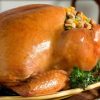Each year, five to twenty percent of Americans get the flu. More than 200,000 are hospitalized due to complications. Because flu vaccines are in tight supply this year and you may not receive one, you should think about additional ways to protect yourself.
The immune system is composed of antibodies and a variety of other elements, all of which are made of protein. Studies consistently show that the power of our immune system declines when we lack protein or calories. Most Americans get more than enough protein and calories, but the elderly and poor may not. Their meat consumption may be limited due to cost, chewing difficulties, or the hassle of preparing it. To safeguard their nutrition, these people can get enough protein and other nutrients from alternative sources, such as dried beans, tofu, nuts and eggs.
Iron, zinc, folate and the vitamins C, E, B6 and B12 also keep the immune system functioning well. For example, in a study of homebound elderly people, those who were iron-deficient had lower immune function than those with normal iron levels. But an amount greater than the recommended levels may have adverse affects. You simply need to meet the basic Dietary Reference Intake (DRI) levels.
Zinc is a case in point. This mineral has received a lot of attention as a potential way to boost immune function. The average U.S. adult meets the Institute of Medicine recommendations of 8 to 11 milligrams (mg) per day. Yet many adults are mildly deficient, and even mild zinc deficiencies can decrease immune power. However, excessive levels suppress the immune system. Research suggests that a total of 40 mg of zinc from food and supplements is safe. Zinc is found in lean meats, seafood, eggs, dairy products and whole grains. Most multivitamins contain a day�s worth of zinc.
A balanced diet and lifestyle seem to be the keys to a healthy immune system. High-fat diets decrease immune function, while extremely low levels of dietary fat also lower a person�s immunity. The lack of carbohydrates, at least for athletes, can also disturb several parts of the immune system. Although the Centers for Disease Control and Prevention (CDC) recommends regular exercise to help our immune systems stay healthy, excessive amounts of exercise decrease the immune function and increase rates of infection. Sleeping enough and drinking enough fluids also help the body fight infections.
Herbal products made from echinacea are currently popular ways to increase one�s immunity, but they show mixed results in studies. These products seem most effective as a short-term treatment when virus symptoms first appear. Research does not indicate that the immune system benefits from long-term use of them. Because echinacea works by increasing immune system activity, people with autoimmune diseases like multiple sclerosis or rheumatoid arthritis should avoid it.
Probiotics, which are foods like yogurt or cultured milk drinks with live bacteria, are under study to see if they might improve the immune function of some people. For example, the immune function tends to decline as people age, but in one study, seniors aged 60 to 83 had greater immunity after six weeks of daily probiotics.
Eating well, exercising and getting enough sleep will help keep you well this cold and flu season, but good hygiene matters, too. If you wash your hands thoroughly and often, you help protect yourself when you touch something or someone contaminated with germs. Even if you do wash your hands regularly, you should also refrain from touching your eyes, nose or mouth, since germs can enter the body through these areas.
AICR









